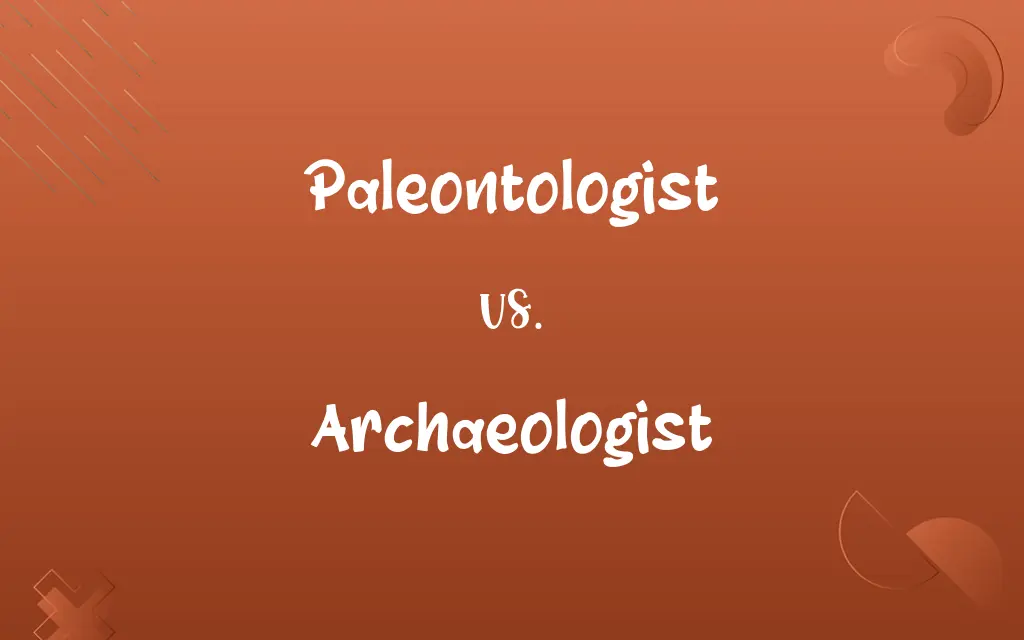Paleontologist vs. Archaeologist: Know the Difference

By Shumaila Saeed || Published on January 25, 2024
A paleontologist studies fossils and prehistoric life, while an archaeologist studies human history and prehistory through artifacts and structures.

Key Differences
A Paleontologist studies fossils, the preserved remains or traces of animals, plants, and other organisms from the remote past. Their work is crucial in understanding the Earth's history and the evolution of life. In contrast, an Archaeologist focuses on the study of human history and prehistory through the excavation of sites and the analysis of artifacts and other physical remains. While paleontologists piece together life's evolutionary puzzle, archaeologists uncover the story of human civilization.
Shumaila Saeed
Jan 25, 2024
Paleontologists often work in the field, uncovering fossilized bones and plants, which they then analyze to understand the Earth's biological and geological past. Their work sheds light on extinct species and ecosystems. Archaeologists, however, excavate sites to uncover artifacts like tools, pottery, and buildings, which help them understand human life, culture, and society from different historical periods.
Shumaila Saeed
Jan 25, 2024
The expertise of a Paleontologist often includes knowledge of biology and geology, as they study the formation of fossils and the environmental conditions of the past. Their work can span from the study of microscopic pollen to massive dinosaur skeletons. An Archaeologist's skill set, however, is more rooted in anthropology and history. They interpret the human past through cultural artifacts and structures, offering insights into human behavior, social structures, and cultural evolution.
Shumaila Saeed
Jan 25, 2024
In terms of methodology, Paleontologists might use carbon dating, stratigraphy, and comparative anatomy to date and analyze fossils. These methods help in reconstructing ancient environments and understanding evolutionary processes. Archaeologists, on the other hand, use various excavation techniques, historical records, and cultural analysis to understand the context and purpose of the artifacts and structures they discover.
Shumaila Saeed
Jan 25, 2024
The field of Paleontology contributes significantly to our understanding of life's evolution and earth's history, providing a timeline of life's progression on our planet. Archaeology, in contrast, enriches our understanding of human history, from early stone tools to complex ancient civilizations. Both disciplines, while distinct, offer invaluable perspectives on the history of life and humanity.
Shumaila Saeed
Jan 25, 2024
ADVERTISEMENT
Comparison Chart
Goal
Understanding evolution and biology
Understanding human behavior and societies
Shumaila Saeed
Jan 25, 2024
Methodology
Geological and biological analysis
Excavation and anthropological study
Shumaila Saeed
Jan 25, 2024
ADVERTISEMENT
Paleontologist and Archaeologist Definitions
Paleontologist
A Paleontologist studies fossils to understand past life forms.
The Paleontologist discovered a new dinosaur species from the unearthed fossils.
Shumaila Saeed
Jan 03, 2024
Archaeologist
An Archaeologist examines past human societies and cultures.
In Egypt, the Archaeologist uncovered evidence of early agricultural practices.
Shumaila Saeed
Jan 03, 2024
Paleontologist
A Paleontologist analyzes fossilized remains to reconstruct ancient ecosystems.
In the desert, the Paleontologist found well-preserved fossils revealing a once-thriving forest.
Shumaila Saeed
Jan 03, 2024
Archaeologist
An Archaeologist uses excavation to explore historical sites.
The Archaeologist's excavation revealed a forgotten medieval fortress.
Shumaila Saeed
Jan 03, 2024
Paleontologist
A Paleontologist uses geological contexts to date and understand ancient life.
The Paleontologist used stratigraphy to determine the age of the fossilized remains.
Shumaila Saeed
Jan 03, 2024
ADVERTISEMENT
Archaeologist
An Archaeologist interprets material culture to understand human behavior.
Studying ancient pottery, the Archaeologist deduced trade patterns of the civilization.
Shumaila Saeed
Jan 03, 2024
Paleontologist
A Paleontologist contributes to our knowledge of biological history.
The Paleontologist published a paper on the impact of climate change on prehistoric species.
Shumaila Saeed
Jan 03, 2024
Archaeologist
An Archaeologist contributes insights into human civilization and evolution.
The Archaeologist's findings shed light on the social structure of ancient Rome.
Shumaila Saeed
Jan 03, 2024
Paleontologist
A Paleontologist examines the evolution and extinction of organisms.
The Paleontologist's research on ancient marine life provided insights into evolutionary patterns.
Shumaila Saeed
Jan 03, 2024
Archaeologist
An Archaeologist studies human history through artifacts and remains.
The Archaeologist excavated ancient tools from a site dating back to the Bronze Age.
Shumaila Saeed
Jan 03, 2024
Paleontologist
The study of the forms of life existing in prehistoric or geologic times, as represented by the fossils of plants, animals, and other organisms.
Shumaila Saeed
Jan 02, 2024
Archaeologist
The systematic study of past human life and culture by the recovery and examination of remaining material evidence, such as graves, buildings, tools, and pottery.
Shumaila Saeed
Jan 02, 2024
Archaeologist
An anthropologist who studies prehistoric people and their culture
Shumaila Saeed
Jan 02, 2024
Repeatedly Asked Queries
What is the main focus of an Archaeologist?
Archaeologists focus on human history and prehistory through artifacts and site excavations.
Shumaila Saeed
Jan 25, 2024
What skills are important for an Archaeologist?
Key skills for Archaeologists include excavation techniques, historical knowledge, and cultural analysis.
Shumaila Saeed
Jan 25, 2024
How do Paleontologists contribute to science?
Paleontologists contribute to evolutionary biology and geology by studying ancient life forms.
Shumaila Saeed
Jan 25, 2024
Can Paleontologists determine the cause of extinction?
Yes, Paleontologists can often infer causes of extinction through fossil analysis and geological data.
Shumaila Saeed
Jan 25, 2024
What is the difference between Paleontology and Archaeology?
Paleontology focuses on ancient life through fossils, while Archaeology studies human history through artifacts.
Shumaila Saeed
Jan 25, 2024
Can Paleontologists predict future evolutionary trends?
Paleontologists can make informed guesses about future evolution based on past patterns, but it's not certain.
Shumaila Saeed
Jan 25, 2024
Where do Paleontologists usually work?
Paleontologists work in the field, laboratories, and museums, studying fossils and geological formations.
Shumaila Saeed
Jan 25, 2024
What type of artifacts do Archaeologists study?
Archaeologists study artifacts like tools, pottery, and structures to understand human societies.
Shumaila Saeed
Jan 25, 2024
What do Paleontologists study?
Paleontologists study fossils to understand past life forms and evolutionary processes.
Shumaila Saeed
Jan 25, 2024
Do Paleontologists work with dinosaurs exclusively?
No, Paleontologists study a wide range of fossils, not just dinosaurs.
Shumaila Saeed
Jan 25, 2024
How do Archaeologists date their findings?
Archaeologists use methods like radiocarbon dating and stratigraphy to date artifacts and structures.
Shumaila Saeed
Jan 25, 2024
How do Paleontologists identify new species?
Paleontologists identify new species by analyzing unique features in fossils and comparing them to known species.
Shumaila Saeed
Jan 25, 2024
Can Archaeologists work in forensic science?
Yes, some Archaeologists specialize in forensic archaeology, helping to solve modern criminal cases.
Shumaila Saeed
Jan 25, 2024
What educational background is required for Paleontologists?
Paleontologists typically need a degree in geology or biology, often with a focus on paleontology.
Shumaila Saeed
Jan 25, 2024
Do Archaeologists work in museums?
Yes, Archaeologists often work in museums, curating exhibits and conducting research.
Shumaila Saeed
Jan 25, 2024
Are there different specializations within Paleontology and Archaeology?
Yes, both fields have various specializations, like vertebrate paleontology or classical archaeology, focusing on specific aspects of their respective fields.
Shumaila Saeed
Jan 25, 2024
What kind of sites do Archaeologists excavate?
Archaeologists excavate a variety of sites, including ancient cities, burial grounds, and historical buildings.
Shumaila Saeed
Jan 25, 2024
Do Paleontologists work with living animals?
While their main focus is on extinct species, Paleontologists may study living species for comparative analysis.
Shumaila Saeed
Jan 25, 2024
Are Archaeologists interested in the study of languages?
Yes, Archaeologists often study ancient languages and scripts as part of understanding past cultures.
Shumaila Saeed
Jan 25, 2024
Are Archaeologists involved in preserving historical sites?
Yes, Archaeologists play a key role in preserving and protecting historical and cultural sites.
Shumaila Saeed
Jan 25, 2024
Share this page
Link for your blog / website
HTML
Link to share via messenger
About Author
Written by
Shumaila SaeedShumaila Saeed, an expert content creator with 6 years of experience, specializes in distilling complex topics into easily digestible comparisons, shining a light on the nuances that both inform and educate readers with clarity and accuracy.









































































